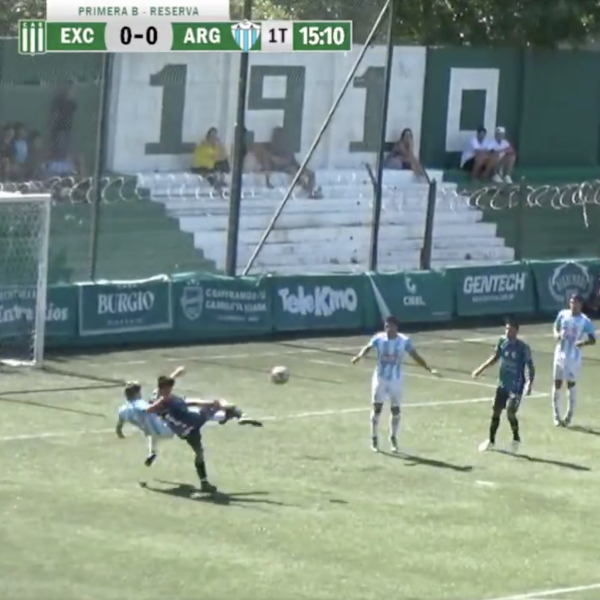It’s not a glamorous role, but it’s the lifeblood of any club. Soccer's executives and administrators are the unsung heros of the sport at all levels.
At best, admins and execs keep a club running like a well-oiled machine. At worst, they find themselves in the headlines for all the wrong reasons. Charged with the oversight of all aspects of the game – from scheduling matches to hiring coaches and balancing the books – administrative life is a juggling act of communication, organization and foresight.
For these reasons, when the job is done well, these smooth operators celebrate in the background. When professional club admins make the news, it’s almost certainly a sign of troubling times.
For those of us involved in the management of youth clubs, the stakes aren't quite so high. But the pain of administrative errors can be equally real. So let's sit back and take a look at some of the biggest #AdminFails in history and see what lessons clubs can learn from the mistakes of the pros.
AdminFail #1: You Registered Him Where?!
While administrators strive to ensure that soccer is being scheduled and played, there is the rare occasion when they mistakenly manage the opposite. The English Football Association (the FA), formed in 1863 and the oldest football association in the world, was apparently using 1863 technology when they accidentally denied Benik Afobe his international debut for the Democratic Republic of Congo.

Benik Afobe couldn't have been pleased with the FA. Photo: @newsinvideos | Twitter
With the Democratic Republic of Congo scheduled to play Guinea in a crucial World Cup qualifier, the English FA sent his registration papers to the wrong country — they sent them to the Republic of Congo, the neighboring country.
“Basically, the FA sent my paperwork to the wrong Congo,” Afobe said.
The FA, you had one job.
What can we learn here? Well, aside from a geography lesson, it's pretty clear that the more chances for error you take out of the registration process, the better your chances are things will go smoothly. Rather than relying on paper forms and on-site registration tables, automate your club or league's registration process online so that parents and players get customized forms, can set up secure installment payments, and you get the right information every time.
AdminFail #2: The Scheduling Nightmare Of The 1963-64 FA Cup
If you've ever felt you're spending too much time each week scheduling and re-scheduling matches for your club (and you might well be if you're still doing it the old-fashioned way), look no further than the 1963-64 FA Cup to feel better about your situation.
The winter of 1963 in Britain was the coldest on record since 1740. Snow, ice, three months of frost, high winds and temperatures as low as -5 Fahrenheit combined to make football unplayable for almost two months. When all had thawed and melted, the resulting mud and rain only compounded the postponements.

Luton play Swindon during the winter of 1963. Photo: @OldFootball11 | Twitter
While the freeze affected more than 400 English league and cup matches, a couple matches fared significantly worse than others. Lincoln City and Coventry City were due to play their third-round FA Cup tie in early January. However, the match was called off a staggering 15 times before finally being played the 16th go around.
In Scotland, clubs Airdrie and Stranraer set the British record by having to reschedule their match 34 times. The postponements were a massive financial burden on the clubs, who resorted to things like using flamethrowers and pouring 80 tons of sand on their pitches in a desperate attempt to defrost the playing surface.
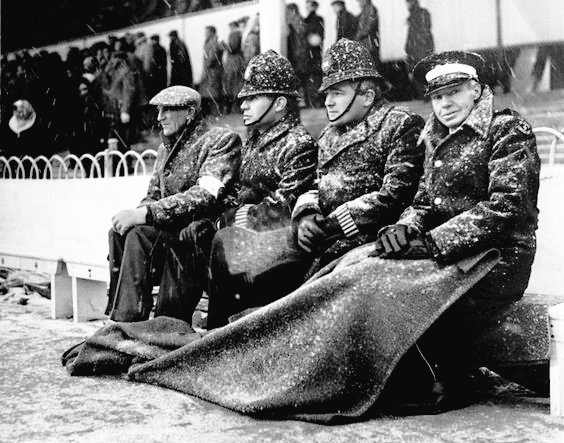
Braving the elements at White Hart Lane in 1963. Photo: @thfcnostalgia | Twitter
In all, the FA Cup third round that year took 66 days to complete. Which must have been an absolute dream for whatever poor soul at the FA had to set the schedule.
So what can we learn as club and league administrators ourselves? You can't always avoid postponements, but you can be better prepared when they happen. Just think how much easier life would have been for FA Cup administrators if they had spreadsheets back in 1963, let alone an app that keeps and communicates schedules for every team in the league. It truly is a great time to be alive. And not living through the cold, cold winter of 1963.
AdminFail #3: Communication Breaks Down, Only One Team Shows Up
While Scotland is home to the postponement record for a match, they also have the shared distinction of having bungled the scheduling for what became one of the strangest World Cup qualifiers of all time.
On October 9, 1996, Scotland walked out of the tunnel at the Kadrioru Stadium in Tallinn, Estonia with their supporters singing “One team in Tallinn, There’s only one team in Tallin”, which was literally true. Their opponent, Estonia, was glaringly absent.
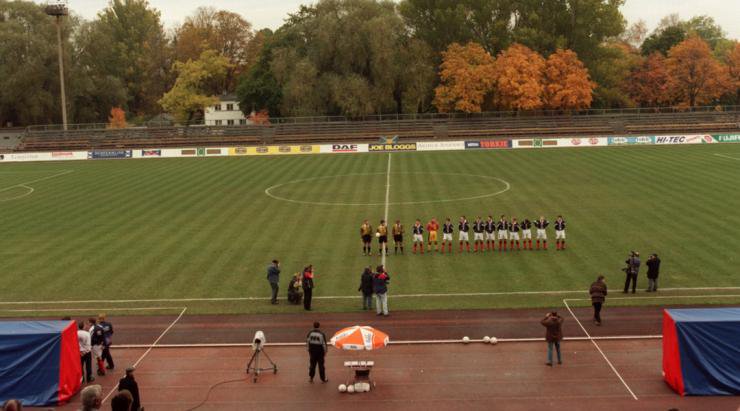
There's something missing here... Photo: @golazo_co | Twitter
No to be deterred, Scotland staged the kickoff, a Scottish player took one touch of the ball and the referee blew his whistle to abandon the match.
Later that afternoon, the Estonia team arrived to warm up while the Scottish team were already journeying home.
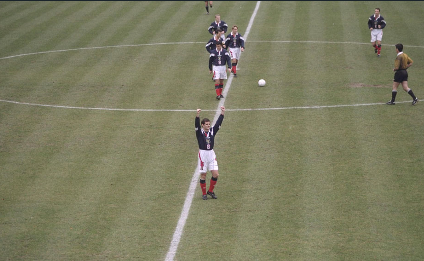
Scotland celebrates their "victory". Photo: @MirrorRowZed | Twitter
This ridiculous 1998 FIFA World Cup qualifier occurred (or, we might say, didn't occur) because of poor communication regarding temporary floodlights that were installed for a 6:45pm kickoff. Scotland practiced under the floodlights the night before the match and found the light to be inadequate. They protested to FIFA and went to bed.
The next morning, FIFA met and agreed that the match should be rescheduled for 1:00pm. They then told the Estonian team, who refused to shift the time (worried about a loss of TV revenue) and stuck with the original plan of 6:45pm. Scotland, however, prepared for the revised time. And you already know where this approach to communication is leading.
In the end, both teams were made unhappy by a decision to have the match replayed on an entirely different day and time at a neutral ground.
For the Scottish Football Association, the second oldest in the world, this outcome was almost certainly avoidable. For you, club and league administrators, it is entirely avoidable. Imagine if instead of relying on a chain of phone calls or emails to communicate with teams and players, you could quickly and easily send an instant update to every team and have a record of that message for the Estonia-of-your-league when they show up late.
If this sounds like the future, that's because you're the Scottish Football Association in 1996. If this sounds like the present, that's because you're using TeamSnap.
AdminFail #4: Hull City Forgets To Check The Database, Writes An Enormous Check
Back in 2009, journeyman Jimmy Bullard signed a four-and-a-half-year deal with Hull City. Going into the final negotiations, Bullard expected to sign a contract that would pay him an agreed upon sum of £40,000 per week. However, a misprint in the contract resulted in Bullard signing a contract which, up until the present, has “changed his life.”
The administrative error saw him sign a contract worth £55,000 per week, an unexpected raise of £15,000 ($21,000) per week. “I saw on the paperwork it said £50,000 so I’ve passed it under the table to my agent and my agent’s gone: ‘Yeah, that’s a misprint, sign it’,” revealed Bullard.

Jimmy Bullard with Hull City. A.k.a. the luckiest man in the world. Photo: @SFR_Sport | Twitter
A year and a half later, Bullard was suspended by Hull City for a breach of the club’s alcohol policy during preseason training camp in Slovenia. His contract was then terminated, only for a court to later rule that Hull City had done so unlawfully.
Bullard was able to collect on his four-and-a-half-year deal, at £55,000 per week, while making only 23 appearances for Hull City in a year-and-a-half with the Tigers.
“I’m celebrating to this day,” claims Bullard. “Thank you Hull City for changing my life. I’m dropping cash everywhere, I’m bleeding cash.”
Hull City's heartache from careless handling of critical player information can be your lesson. And what is that lesson? Keep all your player info in one easily accessible place (such as TeamSnap's instantly accessible team member database, wink, wink). And then, when you're about to sign an enormous contract – or maybe just hit up Red Lobster – check that database and make sure you have the right amount, or that little Johnny doesn't have a shellfish allergy.
AdminFail #5: $3 Billion Club, $3 Website
It's probably not a good sign if you find that your club or league website inspires such hate among players, parents and fans that it gives life to its own complaint thread on Reddit.
This is exactly what happened to Manchester United several years ago when Reddit user rockshandy asked the seemingly innocent question, "Which teams have the best and worst websites?"
While opinions differed on the best websites, there was almost unanimous consensus on the worst.
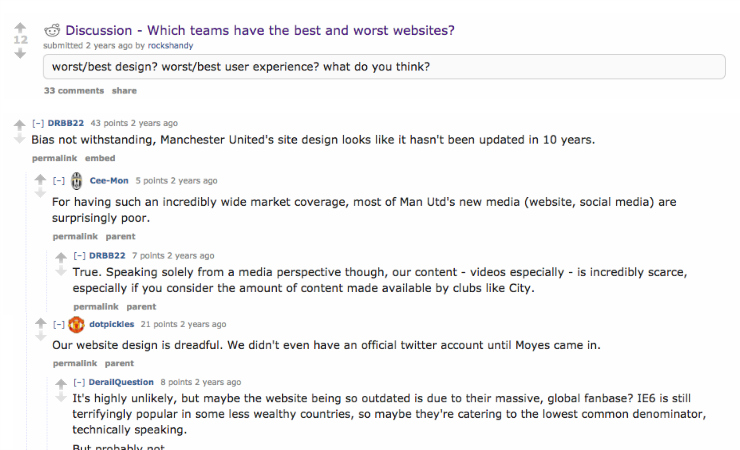
Apparently Manchester United's website was not the Manchester United of websites (Photo: Reddit)
Ouch. It must sting a little to realize that you are the 5th most valuable sports club in the world, and somehow you have managed to build the 5th worst website of all time.
To give Manchester United some credit, they are supposed to be good at soccer, not building websites. So the lesson here for club and league admins may be don't spin your wheels and waste your time trying to build a website from scratch when there are much easier ways to build a gorgeous website in minutes. May we suggest you check out this solution to avoid earning yourself a "Worst of the Web" award next year?
Bonus AdminFail: When Everything Goes Wrong
This one is just too good to leave off the list. It is the story of Ali Dia – a player who ended up having a Premier League career that lasted less than 60-minutes (really) as a result of a comedy of errors.
The story of Dia centers largely around his agent, and Dia is adamant that this is where the blame should be placed. His agent had some interesting tactics, to say the least. While attempting to sign Dia, he reportedly called various clubs claiming he was George Weah, the 1995 Ballon d’Or winner. Pretending to be Weah, he told club higher-ups that he had a friend to recommend to them. If you guessed this friend was Dia, you are correct.
It being 1996, this claim and others (such as that Dia had appeared for the Senegalese national team, Paris Saint-Germain and in the German second division) were taken at face value.
Southampton manager Graeme Souness signed Dia to a short-term deal. “We’ve said, come down and train with us for a week or so and see what’s what,” said Souness. “When someone like that gives you a recommendation you tend to sit up and take notice.”
Which is great in theory. Unless "someone like that" isn't that someone at all.
After Southampton suffered a barrage of injuries, Dia was named to the substitutes’ bench for Southampton’s match against Leeds United after only a week on trial. After 32 minutes, Southampton legend Matt Le Tissier was injured, forcing Souness to field Dia. The perfect storm.

Ali Dia on his first and only Premier League appearance. Photo: @BuzucMarius | Twitter
“He ran around the pitch like Bambi on ice. It was very, very embarrassing to watch,” said Le Tissier. “We were like: ‘What’s this geezer doing? He’s hopeless.’”
Dia was so bad that he was replaced 53 minutes later. “I sent him on today having never seen him play Premiership football,” said Souness after the match. “But I do not have any strikers. Am I enjoying this? Do you enjoy a kick in the bollocks?”
The match was on Saturday, and by Monday morning, Dia was gone.
So there you have it. The pinnacle of administrative fails – that rare situation where a lack of player information, communication and a host of other mistakes conspire to trip you up.
Luckily, none of this has to happen to you. TeamSnap takes the headache out of team and club logistics for over 15 million coaches, managers, players and parents. In fact, TeamSnap can help you work smarter and save up to 15 hours per week during the season. TeamSnap will make your sports life much easier. Learn more today.





